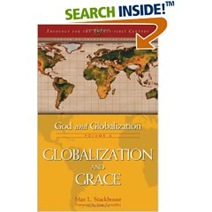God and Globalization, Volume 4
【click cover image and link to amazon.co.uk Search Inside】
The long awaited ultimate volume in the God and Globalization series is fresh out of the press!
While the previous three volumes (published in 2000-2001) were multi-authored, this final one is solely written by the coordinating editor of the series, Max Stackhouse.
Max was one of my most favourite professors during my Boston years, and was possibly the second most important teacher who made his mark on my theological outlook in those days and beyond.
The official synopsis of the book reads:
This final interpretive volume of the God and Globalization series argues for a view of Christian theology that, in critical dialogue with other world religions and philosophies, is able to engage the new world situation, play a critical role in reforming the 'powers' that are becoming more diverse and autonomous, and generate a social ethic for the 21st century.
.............................................
期待已久的 God and Globalization 系列第四冊終於出版了,是Max Stackhouse的個人力作,以系列主編身份為這個課題來個結案陳詞。他在第一章開頭這樣說明寫作目的:
...the purpose of this volume is to offer an answer to this question: What do Christian theology and ethics have to offer to public life in our globalizing epoch —— an era in which the public spheres of life are much expanded and highly differentiated? To pose this question, of course, is to raise the issue of the relationship of theology to the development of large scale social systems, an issue that few try to address and many find odd. Yet, I believe, this is one of the most important and most neglected issues of our times. I will not only argue that Christian theology has much to offer, I will propose that certain normative themes in it do directly pertain to the most important social ethical issues of our times —— the creation of an ethos, a moral infrastructure for a worldwide civil society that could lead to a highly diverse, cosmopolitan civilization —— if that is to happen, it must both be rooted in a valid theological stance and it must be able to engage with the empirical conditions it proposes to address. (35)
在波士頓及其後的一段年月,Max或許是對我的神學影響最深的第二位老師。讀上面這段文字的時候,彷彿回到從前的教室聽他講課,鏗鏘有力抑揚頓挫。
老師關懷的問題沒有改變,基本的角度立場似乎也沒有轉移。然而他的書,正如他的講課一樣,雖然相隔多年,仍舊教我期待。









1 comment:
Interesting to know.
Post a Comment